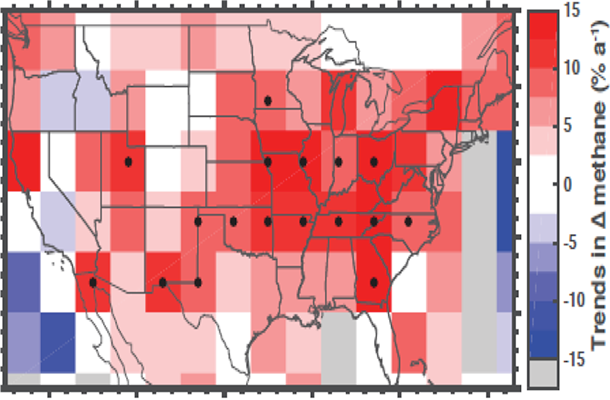Welcome to DU!
The truly grassroots left-of-center political community where regular people, not algorithms, drive the discussions and set the standards.
Join the community:
Create a free account
Support DU (and get rid of ads!):
Become a Star Member
Latest Breaking News
General Discussion
The DU Lounge
All Forums
Issue Forums
Culture Forums
Alliance Forums
Region Forums
Support Forums
Help & Search
Environment & Energy
Related: About this forumU.S. Climate-Changing Emissions Drastically Underestimated
http://loe.org/shows/segments.html?programID=16-P13-00009&segmentID=3[font face=Serif][font size=5]U.S. Climate-Changing Emissions Drastically Underestimated[/font]
[font size=4]Air Date: Week of February 26, 2016[/font]
http://loe.org/content/2016-02-26/loe_160226_b1_methane.mp3

Rising methane emissions across midwestern US (Photo: Courtesy of Dr. Jacob)
[font size=3]Measuring the emissions of the powerful climate-changing gas methane emissions is difficult, as it escapes from wetlands and landfills as well as from oil and gas drilling and pipelines around the world. Now, a team of scientists using satellite data with ground observations has found a better way to calculate its presence. Daniel Jacob, Harvard professor of Atmospheric Chemistry and Environmental Engineering, tells host Steve Curwood their recent study suggests much more methane is escaping than estimates had calculated, and the US could be responsible for up to 60 percent of the extra.
[font size=4]Transcript[/font]
CURWOOD: It’s Living on Earth. I’m Steve Curwood. When the global warming gas methane is first emitted, it’s roughly 90 times as powerful as carbon dioxide, and there’s more than twice as much of it in the atmosphere now than there was before the start of the industrial revolution.
There are many sources – wetlands, agriculture, landfills, and of course, oil and gas production — and the recent massive natural gas leak near Los Angeles drew attention to the environmental impact of methane.
Now a new study from Harvard University, published in the Proceedings of the National Academy of Sciences, documents a spike in global methane emissions to levels far higher than previous federal estimates.
...[/font][/font]
[font size=4]Air Date: Week of February 26, 2016[/font]
http://loe.org/content/2016-02-26/loe_160226_b1_methane.mp3

Rising methane emissions across midwestern US (Photo: Courtesy of Dr. Jacob)
[font size=3]Measuring the emissions of the powerful climate-changing gas methane emissions is difficult, as it escapes from wetlands and landfills as well as from oil and gas drilling and pipelines around the world. Now, a team of scientists using satellite data with ground observations has found a better way to calculate its presence. Daniel Jacob, Harvard professor of Atmospheric Chemistry and Environmental Engineering, tells host Steve Curwood their recent study suggests much more methane is escaping than estimates had calculated, and the US could be responsible for up to 60 percent of the extra.
[font size=4]Transcript[/font]
CURWOOD: It’s Living on Earth. I’m Steve Curwood. When the global warming gas methane is first emitted, it’s roughly 90 times as powerful as carbon dioxide, and there’s more than twice as much of it in the atmosphere now than there was before the start of the industrial revolution.
There are many sources – wetlands, agriculture, landfills, and of course, oil and gas production — and the recent massive natural gas leak near Los Angeles drew attention to the environmental impact of methane.
Now a new study from Harvard University, published in the Proceedings of the National Academy of Sciences, documents a spike in global methane emissions to levels far higher than previous federal estimates.
...[/font][/font]
InfoView thread info, including edit history
TrashPut this thread in your Trash Can (My DU » Trash Can)
BookmarkAdd this thread to your Bookmarks (My DU » Bookmarks)
3 replies, 1166 views
ShareGet links to this post and/or share on social media
AlertAlert this post for a rule violation
PowersThere are no powers you can use on this post
EditCannot edit other people's posts
ReplyReply to this post
EditCannot edit other people's posts
Rec (14)
ReplyReply to this post
3 replies
 = new reply since forum marked as read
Highlight:
NoneDon't highlight anything
5 newestHighlight 5 most recent replies
= new reply since forum marked as read
Highlight:
NoneDon't highlight anything
5 newestHighlight 5 most recent replies
U.S. Climate-Changing Emissions Drastically Underestimated (Original Post)
OKIsItJustMe
Feb 2016
OP
Hydra
(14,459 posts)1. I know something huge is in play, this may be part of it
The last few years where I live have been a constant 10 degrees hotter than they were 10-20 years ago. It's not a fluke, and it isn't going away.
Something is going on to push the warming cycle faster than we ever feared to believe. Are we already past the tipping point and into a feedback loop? Hard to say we aren't...
Ike Y
(22 posts)2. The Fix is In
Don't you worry about that! ![]()
NickB79
(19,270 posts)3. Anyone remember this?
http://www.nytimes.com/gwire/2011/04/11/11greenwire-shale-gas-isnt-cleaner-than-coal-cornell-resea-38125.html
See also: http://www.news.cornell.edu/stories/2011/04/fracking-leaks-may-make-gas-dirtier-coal
"Compared to coal, the footprint of shale gas is at least 20 percent greater and perhaps more than twice as great on the 20-year horizon and is comparable when compared over 100 years," states a pre-publication copy (pdf) of the study, which is slated to be published in the journal Climatic Science and originally obtained by The Hill newspaper.
Howarth and his fellow Cornell professors, Renee Santoro and Anthony Ingraffea, found the process of "hydraulic fracturing," which is required to extract gas from shale, emits enough methane to make it dirtier than coal. Methane is a greenhouse gas that is more potent than carbon dioxide but does not last as long in the atmosphere.
Howarth and his fellow Cornell professors, Renee Santoro and Anthony Ingraffea, found the process of "hydraulic fracturing," which is required to extract gas from shale, emits enough methane to make it dirtier than coal. Methane is a greenhouse gas that is more potent than carbon dioxide but does not last as long in the atmosphere.
See also: http://www.news.cornell.edu/stories/2011/04/fracking-leaks-may-make-gas-dirtier-coal